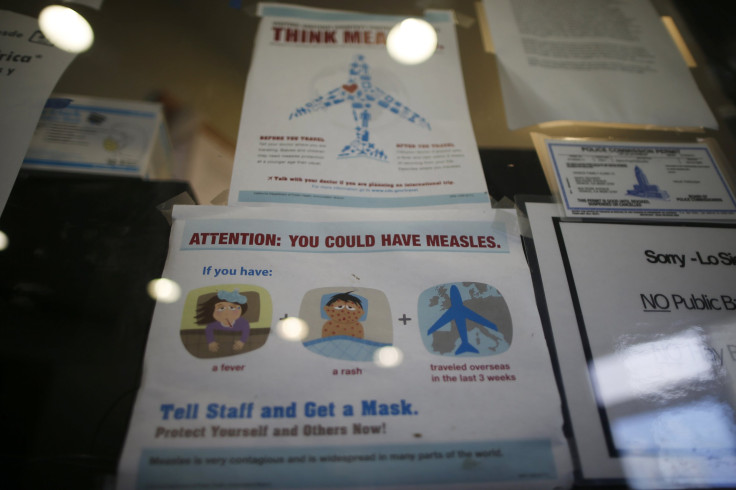Measles Outbreak: CDC May Impose Temporary Flying Ban On Infected People

The Centers for Disease Control and Prevention (CDC) had “pre-discussions” with local and state officials from five states to decide whether people believed to be infected with measles, who had travel plans, can be put on the “Do Not Board” list, preventing them from flying.
According to the Washington Post, steps were taken to warn eight individuals from New York, California, Illinois, Texas and Washington, against taking a flight during the disease’s 21-day incubation period. CDC spokeswoman Caitlin Shockey told CNN that the eight people, who agreed to cancel their flights after learning the federal government could put them on the dreaded list, were either infected by measles, or were believed to have a high probability of becoming infected, or lacked proper immunization to the highly contagious virus, or were suspected of being in close contact with a measles-infected person.
The ‘Do Not Board’ list
The list, that prohibits infectious citizens from boarding aircraft when they are sick, had been used as an effective tool by the federal government since 2007, when it was used to stop the spread of tuberculosis, Dr. Martin Cetron, director of the CDC's Division of Global Migration and Quarantine, explained.
It is, however, not an easy process for health officials to implement the ban. After CDC is made aware of an individual who needs to be put on the list, the agency has to make sure that it takes all possible measures to dissuade the passenger from traveling on a plane. Upon failing to convince the individual, the agency reaches out to the airline with which the individual has made the reservation, to cancel the booking, and also requesting any fees related to the cancellation to be waived.
The agency also speaks to the Department of Homeland Security to place the person on the “Do Not Board” list, which ensures that no other airlines can issue a boarding pass to the individual. However, rarely does it come to the last resort, said Patrick Gallahue, the senior press director at New York City Mayor's Office of Criminal Justice.
“No one has been placed on the 'Do Not Board' list during this outbreak, and we have worked with passengers to minimize the inconvenience of travel disruptions in order to protect the health of New Yorkers and other travelers,” Gallahue said. “People have been very cooperative.”
The nation’s largest outbreak of measles was recorded in New York City — 523 cases since October 2017.
Lawrence Gostin, a professor of global health policy at Georgetown University, Washington, D.C., said discussions about government issued travel ban quickly die down because “it is a politically charged and politically visible request.” Gostin added that the measure “is seen as a government using its power over the people and the states, which is kind of toxic in America right now. There is nothing unethical or wrong about it. It’s just plain common sense that if you have an actively infectious individual, they should not get on an airplane.”
Measles outbreak
According to CDC’s latest report, 880 cases of measles have been confirmed in 24 states between Jan. 1 and May 17 — the greatest number of cases reported in the U.S. since 1994.
The spread of one of the most infectious pathogens was aided by global travel. It was reported that unvaccinated residents returning to the U.S. from places such as Israel, Ukraine and the Philippines, where a large number of measles cases are occurring, caused the majority of the outbreaks in the country.
Another factor contributing to the outbreaks was the failing system of vaccination both domestically as well as globally, fueled partially by a growing anti-vaccine movement, whose supporters believe the MMR (measles, mumps, and rubella) vaccine causes autism and other health complications.
© Copyright IBTimes 2025. All rights reserved.






















